On Sunday, December 29, 2020, the president signed into law a second COVID-19 stimulus package. At this time, information on how and when the provisions of this new legislation will be enacted is limited. While we await specific guidance from the Federal agencies administering the various programs, a summary of provisions of particular interest to artists, arts workers, nonprofit organizations, and small businesses can be found here.
Below you will find a collection of resources that may be relevant to you and/or the artists, arts professionals, and organizations with whom you work. We will continue to update this page for as long as it may be useful.
A previous version of this page was archived on October 13, 2020. You can find the archived version here.
Featured Updates

Update: Shuttered Venue Operators Grants
Did your organization receive a Shuttered Venue Operators Grant from the Small Business Administration? If so, we have an update on some important deadlines and opportunities for recipients of Shuttered Venue Operators Grants (SVOG).
Read more
Pandemic Response & Impact
As COVID-19 spread around the world and across the nation over the Spring of 2020, the Arizona Commission on the Arts endeavored to respond swiftly and efficiently to the rapidly changing needs of Arizona's state's arts sector.
Read more
Shuttered Venue Operators Grant | US Small Business Administration
Eligible applicants may qualify for SVO Grants equal to 45% of their gross earned revenue, with the maximum amount available for a single grant award of $10 million. $2 billion is reserved for eligible applications with up to 50 full-time employees.
Read moreNews and Information
Arizona Together
The State of Arizona is committed to making sure Arizonans have access to the resources they need as we work to get our state through the COVID-19 outbreak. A comprehensive resource for individuals, businesses and volunteers.
Arizona Commerce Authority
Business financial support resources from the Arizona Commerce Authority.
Arizona Department of Health Services (ADHS)
Latest Arizona-specific information and recommendations about COVID-19, including public resources, FAQs; schools and universities.
CARES Act: How to Apply for Nonprofit Relief Funds
Resource from the Independent Sector for individuals, small nonprofit and large nonprofits.
Centers for Disease Control (CDC)
Latest national information about COVID-19 and Information for communities, schools, and businesses, including: resources for large community events & mass gatherings and resources for businesses and employers.
Americans for the Arts (AFTA): the national arts advocacy organization is regularly updating this page about national arts & culture news and resources during the COVID-19 outbreak.
National Assembly of State Arts Agencies (NASAA): providing national arts & culture news updates from the national, not-for-profit, nonpartisan organization that champions public support of the arts in America.
National Endowment for the Arts (NEA): the independent agency of the United States federal government that offers support and funding for projects exhibiting artistic excellence, provides news and updates on federal arts funding. Guidance for grantees with 2020 NEA Project Grants.
Hyperallergic, an arts & culture website, is maintaining a daily report on the impact of COVID-19 on the art world.
General Resources & Assistance
For Individuals
State and Federal Benefits and Eligibility
Under the state’s regular Unemployment Insurance (UI) program, claimants are eligible for up to 26 weeks of benefits. These benefits can be extended an additional 13 weeks under the CARES Act for a total of up to 39 weeks of benefits.
In addition, claimants that are not eligible for the regular UI program or who have exhausted their benefits under that program may be eligible for the federal Pandemic Unemployment Assistance (PUA) program for 13 weeks of UI benefits.
Arizona’s Department of Economic Security (DES) encourages the following individuals impacted by COVID-19 to apply for Unemployment Insurance Benefits:
- Individuals whose employer has permanently or temporarily ceased or drastically reduced operations due to COVID-19 resulting in a reduction of wages;
- Individuals who, due to requirements that the individual be quarantined, are separated from employment and do not have any available paid leave even if the individual has an expectation of returning to work after the quarantine is over;
- Individuals who leave employment due to a risk of exposure or infection and are a member of a population that is particularly susceptible to COVID-19;
- Individuals who leave employment to care for a family member who has been infected with COVID-19; or
- Individuals who for any other scenario are separated from work for reasons related to COVID-19.
Unemployment Assistance for freelance and contract workers
The CARES Act created a Pandemic Unemployment Assistance (PUA) program for individuals that are self-employed, contract workers, those ineligible for state unemployment benefits or have exhausted benefits. Arizona is currently working on the implementation of this new program. Individuals are encouraged to file their applications now for processing as soon as the program is implemented in Arizona.
In general, PUA provides up to 39 weeks of benefits to qualifying individuals who are otherwise able to work and available for work within the meaning of applicable Arizona state statute, except that they are unemployed, partially unemployed, or unable or unavailable to work due to one of the COVID-19 related reasons identified in the CARES Act.
If you have not already submitted an unemployment application, please do so on the state’s online Unemployment Insurance claims system. It is important to apply even if you are ineligible for regular unemployment as you may be eligible for benefits under the CARES Act.
If you already applied for Unemployment Insurance benefits and you think you may be eligible for PUA the Department will contact you when further action is needed. Keep a record of your earnings each week as this information will be required to determine your eligibility when PUA is implemented.
CARES Act Provisions related to Unemployment Insurance
- Federal Pandemic Unemployment Compensation (FPUC)
This emergency benefit provides most individuals receiving unemployment benefits an emergency increase in traditional unemployment benefits of an additional $600 per week through July 25, 2020. - Pandemic Unemployment Assistance (PUA)
In general, this temporary emergency benefit provides benefits to individuals who have historically not been eligible for unemployment benefits or who have exhausted their unemployment benefits.When PUA is released, it will provide up to 39 weeks of unemployment benefits to people who are able and available for work (within the meaning of applicable Arizona state statute), although they are unemployed, partially unemployed, or unable to work due to one of the COVID-19 related reasons identified in the CARES Act (Section 2102(a)(3)(A)(ii)(I)). This includes workers not otherwise eligible for regular unemployment, including self-employed individuals and those who have exhausted regular and extended benefits.
Note: Those who are eligible under PUA will receive the weekly $600 FPUC funds along with the original UI benefits, ranging from $184-$240. The FPUC payments are made every week until July 25, 2020. - Pandemic Emergency Unemployment Compensation (PEUC)
PEUC provides an additional 13 weeks of emergency unemployment benefits for people who remain unemployed after they’ve exhausted their traditional unemployment benefits.
Zoom Cafecito
Applying for Unemployment Insurance as a Freelancer/Part-time Employee
“Learn From My Mistakes!” Recorded on April 24, this interactive bilingual conversation offers tips on what to do and what not to do when applying for pandemic unemployment assistance as a freelance artist and/or freelancer/part time employee.
Facilitated by Milta Ortiz. Co-presented by ASU Herberger Institute for Design and the Arts and the Arizona Commission on the Arts.
SNAP
Nutrition Assistance (formerly the Food Stamp Program) is Arizona’s program for the Food and Nutrition Service (FNS) Supplemental Nutrition Assistance Program (SNAP). Nutrition Assistance supports families to prevent under-nutrition in Arizona.
You can use the screen for eligibility website to see if you qualify for Nutrition Assistance; however, the best way to know if you are eligible is to submit an application for benefits and go through the application process. The application process includes verifying that we have received complete and accurate information along with an interview conducted by our staff. For more information, see the How to Apply for Cash, Medical, and Nutrition Assistance Video.
Able-bodied adults without dependents are only eligible for a few months of Nutrition Assistance unless they are exempt, working, or participating in the SNA E&T program.
If you do not qualify for Nutrition Assistance benefits, or need help with food during the application process, please contact The Emergency Food Assistance Program (TEFAP). Persons receiving Nutrition Assistance automatically qualify for TEFAP.
Meals for Children
Children and teens ages 18 and younger can receive free meals at participating locations throughout the state. You can get meals from any site close to you. A map of participating locations can be found at https://www.azhealthzone.org/summerfood/.
Obtaining health insurance outside Open Enrollment through the Marketplace
Outside Open Enrollment, you can get health insurance only 2 ways:
- With a Special Enrollment Period. You can qualify if you lose job-based coverage, have a baby, get married, or have certain other life changes.
- Through Medicaid or the Children’s Health Insurance Program (CHIP). You can apply any time and can enroll immediately if you’re eligible.
You may qualify for a Special Enrollment Period if you lost health coverage through your employer or the employer of a family member in the past 60 days OR you expect to lose coverage in the next 60 days, including if you lose health coverage through a parent or guardian because you’re no longer a dependent.
If you lost your job, but didn’t also lose health coverage, because your former job didn’t offer coverage, you generally won’t qualify for a Special Enrollment Period. By itself, a job loss (or a change in income) doesn’t make you eligible for a Special Enrollment Period to enroll in Marketplace coverage.
Visit Healthcare.gov and answer a few questions to find out if you can enroll in or change your coverage.
Obtaining Coverage through AHCCCS
Arizona Health Care Cost Containment System (AHCCCS) is Arizona’s Medicaid agency that offers health care programs to serve Arizona residents. Individuals must meet certain income and other requirements to obtain services. For those who qualify, there are no monthly premiums.
AHCCCS offers health insurance for adults age 19 to 64, who do not qualify for AHCCCS Medical Assistance (MA) in any of the following programs:
- Caretaker Relative
- Pregnant Women
- SSI-MAO (age 65 or older; blind or have a disability)
- Young Adult Transitional Insurance (YATI)
Additionally, applicants must meet the following criteria:
- Arizona resident
- Age 19 to 64
- Does not qualify for Medicare
- Is not pregnant
- Is a United States citizen or a qualified immigrant
- Has a Social Security number or applies for one
- To apply for a Social Security number visit the U.S. Social Security Administration
- Make a copy of the form submitted as confirmation of applying for a Social Security Number
- Applies for potential income that may be available, such as unemployment, pensions, and Social Security
- When the individual is the primary caretaker of a child, the child must have insurance coverage
- Is under the income limit
- Is not eligible for any other group
For more information and details, visit https://azahcccs.gov/Members/GetCovered/Categories/adults.html
Mortgage Forbearance
If you are experiencing difficulty making on-time mortgage payments due to the national coronavirus emergency, forbearance may be an option for you.
Forbearance is when your mortgage servicer, that’s the company that sends your mortgage statement and manages your loan, or lender allows you to pause or reduce your payments for a limited period of time.
Forbearance does not erase what you owe. You’ll have to repay any missed or reduced payments in the future. So, if you’re able to keep up with your payments, keep making them. The types of forbearance available vary by loan type.
Mortgage relief options
If you can’t make your mortgage payments because of the coronavirus, start by understanding your options and reaching out for help. The Consumer Financial Protection bureau offer a guide to mortgage relief options.
Protect your finances
As you prepare for the possible spread of the coronavirus or COVID-19, here are resources to protect yourself financially.
Additional Information and Resources
FHFA has established a dedicated webpage with relevant updates and resources available here: www.fhfa.gov/coronavirus(link is external)
Additionally, Fannie Mae and Freddie Mac have their own dedicated webpages for homeowners, with online tools for determining if your mortgage is owned by Fannie Mae or Freddie Mac:
Fannie Mae: Coronavirus (COVID-19) Help(link is external)
- Use Fannie Mae’s Loan Lookup Tool(link is external)
- Or call 1-800-2FANNIE (1-800-232-6643)
Freddie Mac: Extending Help to Homeowners Impacted by COVID-19(link is external)
- Use Freddie Mac’s Loan Lookup Tool
- Or call 1-800-FREDDIE (1-800-373-3343)
Save Our Home AZ is a foreclosure assistance program for underemployed and unemployed Arizonans offering Principal Reduction Assistance, Monthly Mortgage Subsidy Assistance and Second Lien Elimination Assistance to qualified homeowners. The program’s goal is to aid homeowners in avoiding foreclosure by assisting with mortgage affordability.
Rental Eviction Prevention Assistance
Arizona renter households who have suffered a substantial loss of income resulting from COVID-19, including job loss, reduction in compensated hours of work, or other loss of income related to COVID-19, and do not have financial resources to cover their rent may be eligible to receive assistance with rent due on a primary residence in Arizona.
Eligibility is restricted to households with income levels at 100 percent of the area median income adjusted for household size (see chart here) and varies by county. Applicants will be responsible for paying 30% of the total current gross monthly income of the household for rent; households with rent payments that are at or below 30% of their total gross monthly income will not be eligible for assistance.
The first step renters should take if they are concerned about paying their rent or facing eviction is to contact their on-site manager or lease agent by phone or email right away to let them know if you may need rental assistance or a payment plan for your next monthly rental payment. Early communication with residents and managers allows for more time to respond and explore all options.
Arizona Department of Housing provides a self-assessment tool to Arizona residents determine whether they may qualify for rental payment assistance under the Arizona COVID Relief Program.
Arizona Utility Assistance
Low Income Home Energy Assistance Program (LIHEAP) is a Federally-funded program that helps low-income households with their home energy bills.
Community Action Programs (CAPs) and other designated local providers offer several programs to assist with energy assistance. The Division contracts with local CAPs for the Low-Income Home Energy Assistance Program (LIHEAP). LIHEAP is a federally-funded program that helps low-income households pay their heating/cooling bills, minimize crises, and make energy costs more affordable.
Eligible energy customers may receive help in three ways:
- Help to pay current and past due energy bills
- Help with utility deposits
- Help with energy efficiency measures to reduce future energy costs
Who is eligible?
To qualify for LIHEAP, the applicant must have an income that falls within the program guidelines. Priority for service assistance is determined at the local Community Action Agency level. Higher priority is granted if someone in your home is a senior citizen (60 years of age & older), a person with disabilities or a young child under six years old.
How often can someone receive assistance?
The availability of LIHEAP assistance is not guaranteed and is available on a first-come first-serve basis. LIHEAP eligibility is limited to once in a 12-month period. Remember to contact your utility company as soon as possible when you realize you might have trouble paying your bill.
To apply for the LIHEAP program, contact the local Community Action Program in your area. An appointment is needed to obtain utility assistance services.
Please note that there is high demand for assistance from Community Action Agencies, and their phone lines get very busy. It may take you some time to get through.
For Small Businesses & Independent Contractors
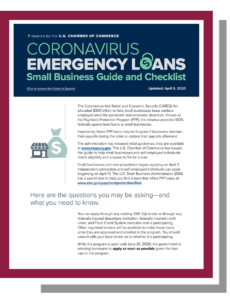
Emergency Loans
Small Business Guide
US Chamber of Commerce
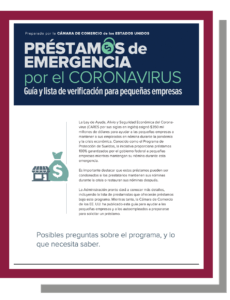
Préstamos de Emergencia
Cámara de Comercio de los Estados Unidos
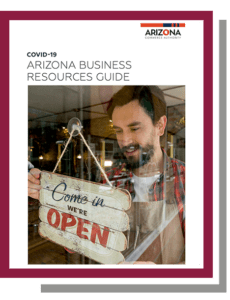
Arizona Business Resources Guide
Arizona Commerce Authority
Small Business Administration
In addition to traditional SBA funding programs, the CARES Act established several new temporary programs to address the COVID-19 outbreak.
- Paycheck Protection Program provides loan forgiveness for retaining employees by temporarily expanding the traditional SBA 7(a) loan program.
- EIDL Loan Advance provides up to $10,000 of economic relief to businesses that are currently experiencing temporary difficulties.
- SBA Express Bridge Loans enable small businesses who currently have a business relationship with an SBA Express Lender to access up to $25,000 quickly.
- SBA Debt Relief provides a financial reprieve to small businesses during the COVID-19 pandemic.
Other Lenders
Funded by corporate and philanthropic partners, the Save Small Business Fund is a collective effort to provide $5,000 grants to as many small employers as we can. We hope these supplemental funds will help you get through the next days and weeks.
Arizona COVID-19 Community Response Fund
The Arizona COVID-19 Community Response Fund will provide flexible resources to organizations in Arizona working with communities who are impacted by COVID-19, also known as the coronavirus. In coordination with public authorities and healthcare experts leading the response to this health crisis, along with community organizations and other funding partners, ACF is working to shape philanthropy’s response to local needs. ACF has intentionally established this fund with flexibility in mind to ensure that these resources may support communities as conditions, circumstances, and needs change throughout this crisis. The foundation is accepting funding requests from Arizona nonprofits whose ability to provide services to the community are impacted by COVID-19.
COVID-19 Community Support Fund
The COVID-19 Community Support Fund provides flexible resources to nonprofit organizations in southern Arizona. The COVID-19 Community Support Fund is designed to complement other available resources and to expand local capacity to address the needs of vulnerable populations disproportionately stressed by the coronavirus outbreak. Funds will be distributed to nonprofit organizations serving Arizona’s most vulnerable with a focus on providing basic human needs and access to healthcare to affected populations, including low-income individuals, residents without access to healthcare, older adults, health care workers, first responders, LGBTQ+ individuals, disabled residents, and communities of color.
COVID-19 Nonprofit Event Relief Fund
The coronavirus (COVID-19) has caused many nonprofit organizations in southern Arizona to cancel fundraising events this spring. These events provide essential financial support for nonprofits to deliver their mission throughout the year. In response, the Community Foundation for Southern Arizona has established the COVID-19 Nonprofit Event Relief Fund. The Fund will provide a one-time grant award to organizations that, due to COVID-19, have had to cancel critical fundraising events and programming, resulting in a significant hardship on the organization. This general operating support grant can replace lost revenue and non-recoverable expenses.
Kiva, a lender specializing in small business, has increased access to its loans for US-based small businesses, including expanded eligibility, larger loans, and a grace period of up-to six months.
The Main Street Initiative Capital Raise Loan
If you have an existing brick & mortar business that has been negatively effected by the COVID-19 outbreak and you launch a capital raise on Mainvest, you may be eligible to receive a $2,000 zero-interest loan immediately*. Then through your capital raise, you can receive over $100,000 of investment from your community.
Small Business Administration Paycheck Protection Program
The Paycheck Protection Program is a loan designed to provide a direct incentive for small businesses to keep their workers on the payroll.
SBA will forgive loans if all employees are kept on the payroll for eight weeks and the money is used for payroll, rent, mortgage interest, or utilities.
You can apply through any existing SBA 7(a) lender or through any federally insured depository institution, federally insured credit union, and Farm Credit System institution that is participating. Other regulated lenders will be available to make these loans once they are approved and enrolled in the program. You should consult with your local lender as to whether it is participating in the program.
January 2020 Update: The second Federal relief package signed into law on December 28, 2020, includes an extension and expansion of the SBA’s Paycheck Protection Program (PPP).
This bill includes $284 billion for additional loans from the Paycheck Protection Program (PPP) and extends PPP through March 31, 2021. Changes to the program include the following:
- Eligibility and Dedicated Funding
- Expands to include qualified 501(c)(6) orgs. (Section 318, page 177- 182 [2100-2105])
- Creates a dedicated $15 billion set-aside for lending through community financial institutions, including Community Development Financial Institutions and Minority Depository Institutions to increase access for minority-owned and other underserved small businesses and nonprofits;
- Creates a set-aside for very small businesses or nonprofits with 10 or fewer employees and for organizations located in distressed areas.
- Expands PPP eligibility for more critical access hospitals, local newspapers and TV and radio broadcasters, housing cooperatives, and 501(c)(6) nonprofits, including tourism promotion organizations and local chambers of commerce.
- Loan Forgiveness
- Expands forgivable expenses to include personal protective equipment, covered supplier costs, facilities modifications, covered worker protection expenditures. (Section 304, pages 120-129 [p. 2043-2052]])
- Simplifies the forgiveness application process for smaller loans up to $150,000 by allowing them to attest on a one-page form that they complied with the terms of the CARES Act PPP provisions. (Section 307, pages 132-138 [p. 2055-2061])
- Improved coordination with ERTC. (page 2462 [p. 4929])
- Second Draw
- Provides a second PPP forgivable loan (up to $2 million) for small businesses and nonprofits that
- Employ 300 or fewer employees, and
- can demonstrate a loss of 25% of gross receipts (based on gross receipts under section 6033 for nonprofits) in any quarter during 2020 when compared to the same quarter in 2019.(Section 311, pages 141-160 [2064-2083])
- Provides a second PPP forgivable loan (up to $2 million) for small businesses and nonprofits that
- Increases the ability for PPP borrowers who did not apply for their maximum eligible loan to reapply or to adjust current loans to meet their new maximum based on current calculations.
SBA is currently offering:
- PPP First Draw Loans, beginning January 11, 2021, for first time program participants
- PPP Second Draw Loans, beginning January 13, 2021, for certain businesses who have previously received a PPP loan.
Applications will be accepted through March 28, 2021, but we suggest you apply as soon as you are able.
The CARES Act and Independent Contractor
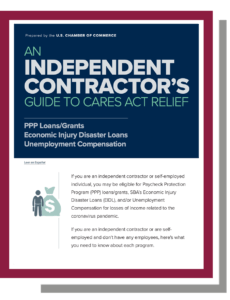
Independent Contractors Guide to CARES Act Relief
US Chamber of Commerce
For Communities
Mutual Aid Networks: Across the country, people are organizing online mutual aid groups to stay connected, share ideas, and help those in need. These grassroots, community-driven, all-volunteer networks use social media and other online tools to catalog community need, pool community resources, and connect community members in need with those who can provide assistance. Do you know of one that is serving your community? Please share in the “Share a Resource” form below!
AARP’s Community Connections page hosts a crowd-sourced map of networks.
- COVID-19 Mutual Aid PHX Metro
- Kinlani (Flagstaff) Mutual Aid
- Laveen Mutual Aid
- Tucson Community Mutual Aid
Aliento offers art & healing workshops for those who have been impacted by deportation, detention, or the threat of family separation. In response to the COVID-19 crisis, Aliento has created resource pages for these communities in both English and Spanish.
Each week, Trans Queer Pueblo, hosts a membership meeting focused on topics especially relevant to Arizona’s migrant and LGBT + community. They also offer free online Zumba classes and have Domingo Travisti | Sunday Fundays. More info can be found at https://linktr.ee/transqueerpueblo and on their Facebook and Instagram pages.
Rising Youth Theatre has established a virtual learning space featuring resources, tools, and activities developed by their community of young artists.
Southwest Folklife Alliance is offering Emergency Relief Funds for Traditional Artists & Culture Bearers. SFA is primarily funding traditional artists and culture bearers between 40 and 65+ years of age, who are living in remote or historically marginalized neighborhoods in Arizona. The application is in the form of a brief survey that will also help them identify the unique needs of this constituency.
NDN Collective’s COVID-19 Response Project is designed to provide immediate relief to frontline organizations, Tribes, and individuals who are providing essential services to Indigenous communities.
Artist-to-Artist Conversations and Knowledge Sharing
Beginning in March 2020, in response to the COVID-19 crisis, the Arizona Commission on the Arts began hosting online conversations and convenings to provide a space for Arizona artists and creative sector workers to discuss challenges and opportunities, share resources and information, and generally support each other during a uniquely difficult time.
Some of these sessions were recorded and are shared below.
What Can Poetry Offer Us in Distressing Times? Former United States Poet Laureate Juan Felipe Herrera, poet and author Inez Tan, and Arizona Poet Laureate Alberto Ríos visit Zócalo Public Square to consider how reading and writing poetry can save us when all seems lost.Thursday, May 7, 2020 — 6:30 PM PDT.
Coping with COVID: Centering Wellness and Self-Care for Creatives: Tues, April 21, 4-5pm ET. Artist and energy healer Rhonda Wheatley will lead a conversation around wellness amid the isolation, anxiety, and uncertainty many are facing due to the coronavirus pandemic.
Negotiating the Unexpected: Tues, April 21, 1-3:30pm ET. Art lawyers Sarah Conley Odenkirk and Jonathan Tobin will share sources for financial support and ways to keep your business afloat during the COVID-19 crisis.
It Was Always Possible: Centering the Leaders Who Were Here All Along: Erasure and isolation is not new to people with disabilities, carers and parents of small children, folks in rural communities, and indigenous artists. Our current crisis offers an opportunity for us to center the leadership and expertise of artists who already know how to create sustainable and resilient practices. Join these leaders for discussion about how to work collectively, collaboratively, and imaginatively in a system that was not built with them in mind. (04/07/20)
Look for the Helpers: Learnings and Teachings for Building Resilience: In this conversation, healing arts practitioners and faith leaders, all of whom have a relationship to or practice in the arts, will offer guidance from their traditions and expertise as a means of supporting our community’s growing capacity for resilience. (04/14/20)
Canceled Gigs Due to Coronavirus? Here’s What You Can Do (Lisa Husseini)
Coronavirus: MUST The Show Go On? Podcast (Event Safety Alliance)
EMERGENCY RESPONSE + PREPAREDNESS FOR DANCE ORGANIZATIONS + INDEPENDENT ARTISTS (DANCE/NYC)
How Performers Can Survive the “Year of the Cancellation.” (Sean Buvala)
CRAFT member meeting and discussion to share and exchange ideas and feel connected during this time of social distancing. Thursday, April 23, at 4 p.m. Eastern time. Sign up by emailing [email protected].
The Performing Arts Readiness Project (PAR) offers free webinars on many aspects of arts preparedness. More are scheduled, and previous webinars have been recorded and are available on demand.
Come Together: The Art of Gathering in a Time of Crisis: led by The Public Theater’s Bryan Joseph Lee focused on how artists can cultivate virtual spaces with purpose, intention, and structure. ASL & Captioned. Presented by HowlRound Theatre Commons. (03/31/20)
Ask An Expert: Contracts, insurance, visas, employment and legislation in the COVID-19 Era. Alliance of Performing Arts Conferences presents a free webinar that will gather a group of legal experts to discuss and answer questions about the current business, legal, and financial realities facing the performing arts sector. (03/27/20)
Financial Strategies for Freelance Artists in a Time of Crisis: about both the practical and the philosophical/emotional elements of financial preparedness, and offer resources and support to help freelance artists get through this challenging time. Led by financial planner, tax preparer, organizer, and artist Amy Smith. ASL & Captioned. Presented by HowlRound Theatre Commons. (03/26/20)
How 10 Artists Are Staying Creative through COVID-19: article from ARTSY (03/24/20)
Artists in a Time of Global Pandemic: conversation focused on shared resources and building and grounding our national community. ASL & Captioned. Presented by HowlRound Theatre Commons. (03/16/20)
National Endowment for the Arts, Art Works Blog “Are You Including People with Disabilities in Your Virtual Arts Events?”
How to Make Your Virtual Meetings and Events Accessible to the Disability Community: resource from Rooted in Rights on key tips and information to producing well rounded accessible virtual content.
Leading Accessible Virtual Programs: webinar hosted by the Chicago Cultural Accessibility Consortium showing the processes involved in creating accessible virtual content.
How to Caption Your Videos: by Tina Childress, See Hear Communication Matters Blog, offers a sample guide for captioning online videos.
Captioning Options for Videoconferencing and Learning Management Systems: by Tina Childress, See Hear Communication Matters Blog, provides a detailed listing of captioning options for videoconferencing platforms and Learning Management Systems (LMS).
How to Produce a Livestreamed Event: article by HowlRound Theatre Commons shares a step-by-step event breakdown example.
#DeafEdTips: E-Learning Accessibility: blog by the Center for Deaf and Hard of Hearing Education shares information and guidelines on how to provide accommodations and accessibility for students.
Related News

Update: Shuttered Venue Operators Grants
Did your organization receive a Shuttered Venue Operators Grant from the Small Business Administration? If so, we have an update on some important deadlines and opportunities for recipients of Shuttered Venue Operators Grants (SVOG).
Read more
Pandemic Response & Impact
As COVID-19 spread around the world and across the nation over the Spring of 2020, the Arizona Commission on the Arts endeavored to respond swiftly and efficiently to the rapidly changing needs of Arizona's state's arts sector.
Read more
Shuttered Venue Operators Grant | US Small Business Administration
Eligible applicants may qualify for SVO Grants equal to 45% of their gross earned revenue, with the maximum amount available for a single grant award of $10 million. $2 billion is reserved for eligible applications with up to 50 full-time employees.
Read more
Update: COVID-19 Relief Programs and Resources
Last week we shared news of the second COVID-19 federal relief package. In the interest of ensuring Arizona's arts & culture sector is well-prepared to take full advantage of the opportunities presented by this package, we want to alert you to additional information and resources that have emerged in the week since.
Read more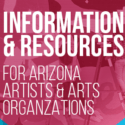
COVID-19 Resources (Archive)
A collection of resources that may be relevant to you and/or the artists, arts professionals, and organizations with whom you work. We will continue to update this page for as long as it may be useful.
Read more


